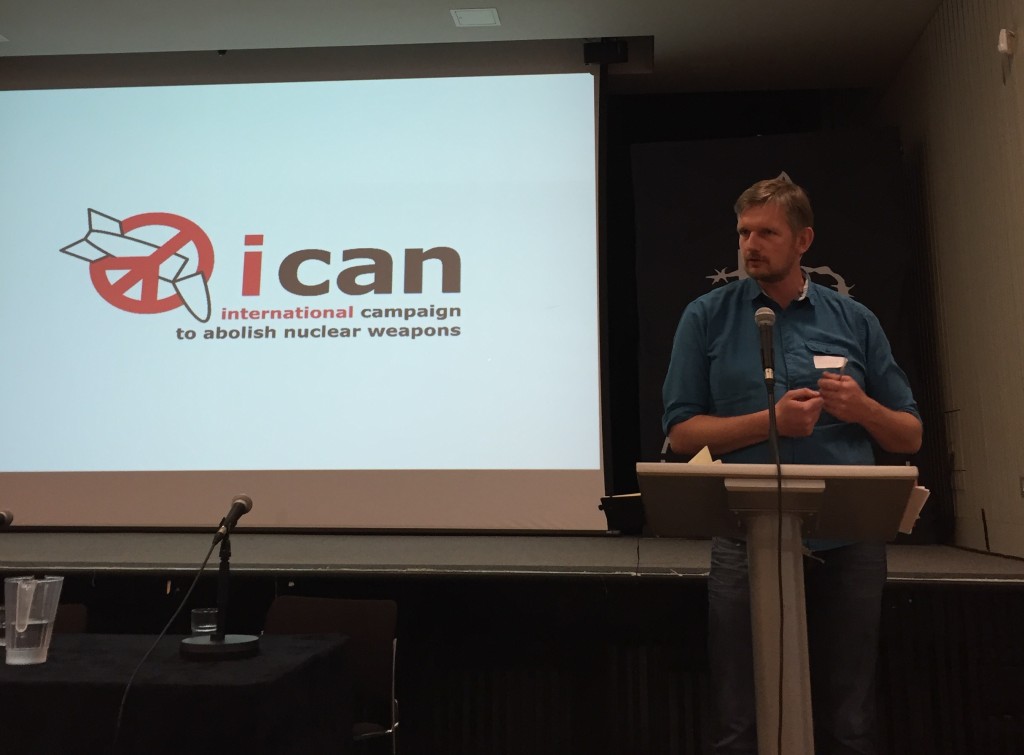On the eve of the 60th anniversary of the Russell Einstein manifesto, more than 60 campaigners gathered in London to prepare for negotiations on a treaty banning nuclear weapons.
Campaigners came mostly from around Europe with about half from the UK. Enthusiastically getting together to plan and prepare for the next step in the process to finally outlaw nuclear weapons.
One of the meeting highlights was hearing from two veterans from the UK Christmas Island tests who gave their testimony and discussed their experiences. Complimenting other victim testimonies heard at meetings in the past, these men described seeing the bones of their hands through shut eyes and the effects on their bodies and their families ever since. I’m surely not the only person who wiped tears when one of the gentleman described losing his pre-teen daughter and living with the anger and guilt that her premature death was because of his military service.
Moving from emotion to action we spent a good bit of time talking through the principles of a nuclear ban treaty and the process to get negotiations started. The testimonies of the survivors illustrated the necessity to find ways to recognize and be responsible towards victims of nuclear weapons. The belief that nuclear weapons are okay for some but not all highlighted the need to evolve beyond the discriminatory prohibitions in the NPT and outlaw the development, production, testing, acquisition, stockpiling, transfer, deployment, threat of use, or use of nuclear weapons, as well as assistance, financing, encouragement, or inducement of these prohibited acts.
Often it can be easier to talk about the how than the what. We all agree on the what- to outlaw the only weapon of mass destruction still not explicitly prohibited by international treaty. However, during this meeting a lot of time was spent discussing how this will work and how it will be impactful, even without the participation of nuclear armed states in negotiations.
Living in a semi-nuclear armed state, the Netherlands, it is important to see the many ways that banning the making, having and using of nuclear weapons will make a difference on those who posses them, as well as those who train to drop them.
One of the workshops looked at how to use the Don’t Bank on the Bomb report in a local context to stigmatize nuclear weapons and build whole of society support for a ban. As one of the principles of a future treaty includes prohibiting the financing of nuclear weapons production- getting together and talking about how that works and what can be done about it now- is getting ready to make the ban an even more effective instrument when it enters into force.
There were also discussions about how we get there. What is the best place to negotiate? Who should be at the table? What offers the best chances of success? Recognizing that the ban will be transformational and impact nuclear arsenals and the policies around them means understanding that the best place to negotiate is a place that is open to anyone sincerely sharing the objective of outlawing nuclear weapons leading to their elimination.
During discussions campaigners brought up a number of the traditional places that people talk about nuclear weapons, including the Conference on Disarmament and the General Assembly. However, because of the way consensus is used as a veto (blocking progress for nearly two decades) and the explicit exclusion of civil society, the CD was quickly ruled out as an ideal place for negotiations. The General Assembly got some discussion as well, but quite a few individuals raised concerns that any GA process could be subject to a range of problems including but not limited to significant delays, diversions, and a mandate that is for discussions but not negotiations.
Not all of the meeting was spent talking about what and how- there was also a great chance to hear from many campaigners about the activities going on in their countries to overcome the cold war hangover of nuclear weapons. From a French university tour to speaking at sessions of the German Social Democrats conference, campaigners are working hard to get their governments to take a step towards a ban. As ICAN’s Executive Director Bea Fihn said so clearly, not every government is ready to step up to lead the way, but every government can take a step in that direction.

